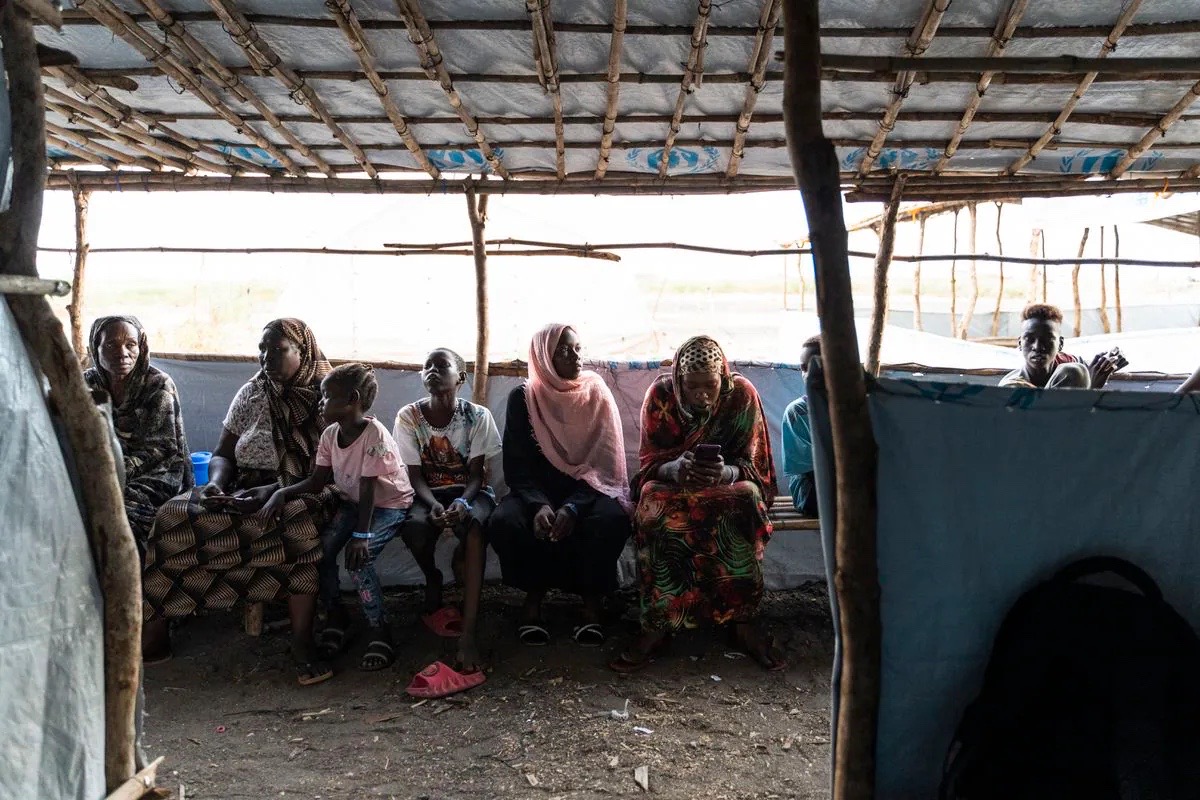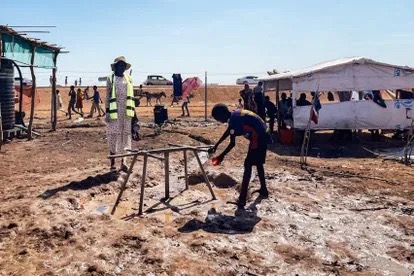THANKS to Lola Hierro (Hola Lola!) for informative reports and photos from Renk, South Sudan. At the Renk Transit Center, which has a capacity of 3,000 people, there are more than 16,000 current residents, and the roads that connect this out-of-the-way corner to the rest of the country are
waterlogged by floods caused by end-of-summer rains. Renk’s risk lies in the fact that this [Vibrio cholerae] bacillus is transmitted through contact with contaminated foods and liquids, in conditions of overcrowding and lack of safe access to water and sanitation. Read more in this report.
From EL PLAIS
By LOLA HIERRO (Renk / Madrid)
Dated Tuesday, 12 December 2023 - 23:40 WET - full copy:
Cholera crosses the Sudanese border and bursts into South Sudan refugee camps
The Ministry of Health confirms a positive case in the Renk Transit Center, located in the north of the country, where thousands of displaced people are living shoulder to shoulder
Waiting room of the clinic located at the Renk Transit Center in northern South Sudan. ALA KHEIR (UNHCR)
South Sudan’s Ministry of Health has confirmed the first case of cholera in Renk, a city in the far north of the country that is suffering a humanitarian crisis amidst the thousands of people from Sudan who have been displaced since war broke out last April. Sudan has been struggling against an outbreak of the diarrheal disease since September 26 and to date has documented 4,000 cases and 130 deaths.
“The public is advised not to panic, as measures have been put in place to respond to this threat,” the ministry has announced. Nonetheless, in Renk, general sentiment is very different, as described via WhatsApp by Atsuhiko Ochiai, coordinator of a Doctors Without Borders (DWB) clinic located in the Zero settlement of Renk, which has more than 3,500 residents. “[The situation] is getting worse. More people come from Sudan all the time and the water, latrines, food, plastic sheets, hygiene kits, etcetera, are just not enough. Open-air defecation is common,” he warns.
Doctor Ochiai’s fears are due to a minimal health infrastructure. More than 400,000 people have crossed the border in the last eight months. They arrive in impoverished conditions, without money, without a home in which to stay, with no hope of feeding or cleaning themselves or accessing any service beyond what meager humanitarian aid they can obtain. That’s because all the most important United Nations agencies and nonprofits are present in Renk, but the funds available to help the population are not sufficient: only 32% of the more than 225 million euros required by the UN refugee agency (UNHCR) have been covered. At the Renk Transit Center, which has a capacity of 3,000 people, there are more than 16,000 current residents, and the roads that connect this out-of-the-way corner to the rest of the country are waterlogged by floods caused by end-of-summer rains.
A woman cares for her son, who has been admitted to the hospital in Renk, northern South Sudan. ALA KHEIR (UNHCR)
Cholera presents a public health problem in 47 of the world’s poorest countries, where between 1.3 and four million cases are registered annually. The illness is caused by the Vibrio cholerae bacteria, which provokesd intense diarrhea, up to 20 liters a day, which can kill a person within four hours. With adequate treatment — rehydration and antibiotics in the most severe of cases— the death rate does not rise above 1%, but without it, it can soar to 50%.
Renk’s risk lies in the fact that this bacillus is transmitted through contact with contaminated foods and liquids, in conditions of overcrowding and lack of safe access to water and sanitation. This is precisely the scenario in the far north of South Sudan. If the region was already living in poverty and had been punished by nearly a decade of violence caused by internal conflicts, with 74% of the population in need of humanitarian aid, the waves of Sudanese and South Sudanese returnees from the new war have only worsened the situation.
The cholera patient identified at the transit center, a 38-year-old man who had recently crossed the border between the two states, has recovered. For the time being, no other positive cases have been reported. But the fear of new cases is very present. “When community-wide transmission of cholera happens in Renk, it will be catastrophic,” Ochiai predicts.
Doctor Francisco Luquero is the head of the team responsible for high-risk epidemic programs at the Global Alliance for Vaccines and Immunization (GAVI) and was in South Sudan during the 2014-2017 outbreak that affected more than 28,000 people. The doctor explains that since 2019 there have been hardly any cases, and those that have appeared have been very mild thanks to the country’s efforts to control the previous outbreak and the prevention campaigns that have been orchestrated “We know that in these scenarios there is a high risk of transmission and that in these areas it is difficult to provide adequate treatment, so there is concern,” he says over the phone.
With Sudan’s outbreak in mind, World Health Organization (WHO) mechanisms have been activated to avoid cholera’s arrival. These mainly involve the promotion of personal hygiene, especially hand-washing, raising awareness in communities, and distributing hygiene supplies to 3,000 households, including domestic items for transporting water like disinfectants and purifiers. But such measures are nearly impossible to implement when there are thousands of people sleeping outdoors, on muddy ground where rainwater stagnates and forms putrid puddles, and where there is no sewage system or toilets.
Water stagnates between tents where thousands of refugees survive in Renk. ALA KHEIR
A month before cholera had its opening act, fears were already present. In Zero’s mobile clinic, doctor Ferida Manoah hardly had time for a break: many small patients required her attention. Patients like Nya, María’s daughter. The little girl, at just over a year old, was due for a medical check-up. Her mother brought her to the health center, accessible only by a long row of sandbags that had been placed over the stagnant water.
Since she was apparently healthy, María only received some tips on nutrition and hygiene. Above all, the latter. “We have a large number of diarrhea cases and we’ve suspected the presence of typhus, but we aren’t able to test,” said Mahoah. Before the cholera outbreak, diarrhea was the third leading cause of mortality in Renk, after malaria and pneumonia.
A simple, but elusive remedy
The plan to address cholera begins with giving specific information to all health staff and community workers on how to inform authorities if they detect a suspicious case. Until there is confirmation, an outbreak is not announced, but independent of test results, it’s very important to provide treatment to patients to avoid death by dehydration.
Blocking the entrance of the illness at the border would be ideal, but in practice that turns out to be nearly impossible. The International Organization for Migration (IOM) has health stations open from 6 a.m. to 8 p.m., which means that for 10 hours a day there is no one available to test. Not to mention, with 2,000 to 3,000 people crossing every day, even if the stations were open 24 hours, it would be very difficult to evaluate everyone who passes through.
Drinking water station in the field of Joda, where thousands of people wait weeks to be transported to the Renk Transit Center in South Sudan.
LOLA HIERRO
Luquero thinks that prevention at the border is not realistic because similar to people affected by Covid-19, a patient can be contagious and also asymptomatic, something that occurs in 80% of cases. Nonetheless, for him it “is super necessary to replenish kits to treat the sick, because rehydration saves lives.”
The GAVI leader trusts in the skills South Sudan showed in the past thanks to its prevention strategy. “South Sudan has taken a lot of initiative in vaccination, reactive as well as preventative,” he says. They have implemented various campaigns and since 2019, received more than three million doses through the Global Task Force on Cholera Control. “It’s true that it’s a very fragile country, but it’s also a case in which they’ve been able to successfully control a national outbreak,” he says.
Immunization campaigns, however, have not yet arrived to Renk. Luquero thinks it would be best to solicit them as soon as possible from the International Coordinating Group (ICG) on Vaccine Provision, which is in charge of emergency requests. “It’s one method that can be used to access the doses more quickly, linked to the humanitarian crisis in the north, without having to make a global vaccination plan,” he says. “What we need to do is to make a good epidemiological assessment as quickly as possible and, based on that, send the vaccine request as quickly as possible. And I emphasize speed.”
View original: https://english.elpais.com/international/2023-12-12/cholera-crosses-the-sudanese-border-and-bursts-into-south-sudan-refugee-camps.html
END











